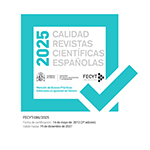Organización y semántica naval moderna
Abstract
This article looks at the use of seafaring language in the Modern Era. It dwells especially on the words “escuadra”, “flota” and “convoy” (squadron, fleet and convoy), examining the mutations therein during the imperial wars waged between Charles V (Charles I of Spain) and Francis I of France, which favoured the birth and development of Atlantic piracy. It analyses the names of the various functional navies, created on an ad hoc basis as the various weak points appeared in Spain’s traffic with the Americas. The article also deals with the commanders of these groups and the names given to the onboard personnel. Specific examples are given of modern semantics with comments on the changes that occurred upon the advent of the Bourbons and the creation of the Military Navy of Spain (Marina Militar de España). The paper also investigates the rich semantics of the rudimentary naval artillery of the time and then winds up with a section on naval architecture, a field so vast it would really need an article in its own right.Downloads
Article download
License
In order to support the global exchange of knowledge, the journal Cuadernos de Historia Moderna is allowing unrestricted access to its content as from its publication in this electronic edition, and as such it is an open-access journal. The originals published in this journal are the property of the Complutense University of Madrid and any reproduction thereof in full or in part must cite the source. All content is distributed under a Creative Commons Attribution 4.0 use and distribution licence (CC BY 4.0). This circumstance must be expressly stated in these terms where necessary. You can view the summary and the complete legal text of the licence.












